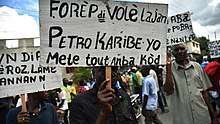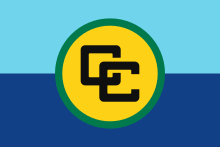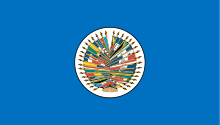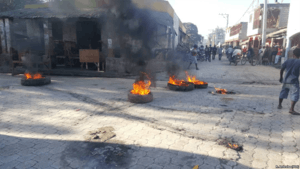2018–2019 Haitian protests
Protests began in cities throughout Haiti on 7 July 2018 in response to increased fuel prices. Over time these protests evolved into demands for the resignation of the president of Haiti, Jovenel Moïse. Led by opposition politician Jean-Charles Moïse, protesters state that their goal is to create a transitional government to provide social programs and to prosecute allegedly corrupt officials.[3][4]
Background and 2018 protests
Released in November 2017, a Senate probe of the period 2008-2016 (concerning the René Préval and Michel Martelly administrations as well as the chief of staff of then-sitting President Jovenel Moïse) revealed significant corruption had been funded with Venezuelan loans through the Petrocaribe program.[5]
When Venezuela stopped shipping oil to Haiti in March 2018, this led to fuel shortages. With the removal of government subsidies in July, kerosene prices went up over 50 percent, with similarly steep hikes on other fossil fuels.[6] These rises in taxes on gasoline, diesel, and kerosene that went into effect on 7 July 2018 brought Haitians into the streets. Flights were canceled into and out of Haïti by US airlines.[7][8] The government backed down on the tax increases, and the President accepted the resignation of the inexperienced Jack Guy Lafontant as Prime Minister on 14 July 2018, replaced one month later by Jean-Henry Céant.[9][10]

In mid-August 2018, Gilbert Mirambeau Jr. tweeted a photo of himself blindfolded holding a cardboard sign with "Kot kòb PetwoCaribe a ?" (where did the PetroCaribe money go?) written on it. The hashtag #petrocaribechallenge was soon widely circulated on social media.[11][10]
Anger over the revelations and accusations from the continuing investigation simmered through social media into the autumn and boiled over again, first in October 2018, with tense scenes and violence in Les Cayes, in Jacmel, and in Saint-Marc.[12] Then, a week of protests in November 2018 led to 10 deaths, including several killed when a government car "lost a wheel and plowed into a crowd".[13]
2019
February
Significant protests broke out again in February 2019 following a report from the court investigating the Petrocaribe Senate probe.[1][14][15] Economic problems and the increased cost of living helped fuel the protests.[15]
On 7 February, protesters targeted and damaged wealthy Haitians' luxury vehicles.[15] The following day, the mayors of Petion-ville and Port-au-Prince announced the cancellation of pre-Carnival events.[15] Two days later protestors clashed with police, with demonstrators throwing stones at the home of President Moïse, after one of his allies' security personnel struck a woman's car and began to beat her.[16]
On 12 February, protesters burned down a popular market, looted stores and assisted with a prison break in Aquin that freed all of the facility's prisoners.[14][17] In Port-au-Prince, the building housing the Italian and Peruvian consulates was looted by protesters.[18][19]
President Jovenel Moïse addressed the country on 14 February, saying he would not step down and "give the country up to armed gangs and drug traffickers".[20]
During a funeral procession on 22 February, Haitian police fired tear gas at a crowd of about 200 people carrying the casket of a man killed during protests days earlier.[21] Opposition leader Schiller Louidor called for future protests, though the overall size of protests began to subside that day.[21]
March
Three days after the lower house voted a censure motion against Prime Minister Jean-Henry Céant's government on 18 March 2019,[22] Jovenel Moïse replaced Céant with Jean-Michel Lapin.[23] As of mid-November 2019, this change had not been ratified by the Haitian Parliament. Lacking a government because of the impasse between the President and the Parliament, Haiti has had hundreds of millions in international aid—for which having a sitting government was a prerequisite—suspended.[24]
June
During escalating protests on 10 June, journalist Rospide Petion was shot in a company car on his way home from Radio Sans Fin in Port-au-Prince, where he had criticized the government on air before leaving the station.[25][26]
October
On 4 October, thousands protested across Haiti. In Port-au-Prince, the mayor, joined the protestors in calling for Jovenal Moïse to step down. Two days earlier the opposition sent a letter by delegation to the UN Secretary General denouncing the sitting President's role in the Petrocaribe affair, and the government's role in a massacre in La Saline.[27][28] Lyonel Trouillot wrote in L'Humanité, "Without dipping into conspiracy theory, there is something worrying about the international community's silence about the Haitian situation."[29][30]
On 11 October, a second radio journalist critical of the government, Néhémie Joseph, was found dead in the trunk of his car in Mirebalais.[31][32]
On 22 October, thousands of Catholics demonstrated in the capital. Archbishop Max Leroy Mésidor asked Haitian leaders to heed the people who "cannot go on any longer. We are fed up." Energy crises, road blockages, and widespread unrest have led to massive drops in tourism, causing the closure of hotels in Petion-ville, where the Best Western Premier closed permanently,[33] and in Cap-Haïtien, where Mont Joli was closed.[34] Two people were killed in protests in Port-au-Prince on 27 October. Masked police officers were themselves out on the streets demonstrating that day because of low salaries and lack of health insurance.[35]
Though the Haitian constitution calls for legislative elections in October, none were held in October 2019.[24] The United Nations announced they had counted 42 deaths and 86 injuries since mid-September.[36]
November
"Peyi lok" ("country lockdown")[33] is how the situation was described in Haitian Creole in November 2019 after two and a half months with schools, courts, businesses, public services, and economic production largely shut down.[37][33]
December
Though parents and school directors still felt uneasy about it amidst barricades and gunfire, schools across the country began to reopen in December.[38][39]
The US Under Secretary of State for Political Affairs (David Hale) visited Haiti on 6 December, following up on US Ambassador to the UN Kelly Craft's November visit.[40] During the visit, he met with the administration and with leaders from several opposing political parties, some of whom, including Fanmi Lavalas and Fusion-Mache Kontre, refused any collaboration with the sitting president.[41] On 10 December, the US House Foreign Affairs Committee began hearings on the situation in Haiti, which Frederica Wilson had pushed for. At the hearing, Maxine Waters was sharply critical of US support for the sitting president. Neither the State Department nor USAID was present at the hearings.[2]
Actions
Jovenel Moïse government
President Jovenel Moïse has called for his opposition to participate in peaceful dialogue stating "the country’s problems aren’t solely political. The country’s problems are social, economic and political".[15] The national police has stated that there are "malicious individuals" who had interrupted peaceful protests in the country.[42]
Opposition
The opposition has been led by Jean-Charles Moïse.[3] This opposition has declined offers for dialogue, demanded Jovenel Moïse's resignation,[15] and organized a nationwide general strike to force him to resign from office.[17] Alongside opposition lawmakers, he called for a transitional government to replace Jovenel Moïse: "If Jovenel Moïse does not want to step down from power, we are going to name an interim president in the coming days".[3][4]
Arrest of foreign mercenaries
The Port-au-Prince newspaper Le Nouvelliste reported on 18 February 2019 that a Haitian citizen and seven non-Haitians were arrested in the city. At the time of their arrest, they were carrying rifles, pistols, drones and satellite phones in their vehicle, which had no license plates.[43] The Haitian Foreign Minister Bocchit Edmond confirmed that among them were five Americans.[44] According to the editor of Haïti Liberté, the group included two former Navy SEALS, a former Blackwater employee, and two Serbian mercenaries living in the US. They were tasked with protecting the former head of the National Lottery, who intended to transfer US$80 million from a PetroCaribe bank account—controlled jointly by the President, the Prime Minister, and the President of the Central Bank—to a bank account solely controlled by President Jovenel Moïse.[45]
Violence towards the press
According to the Committee to Protect Journalists, some reporters have been targeted by protesters.[42] One Reuters journalist, Robenson Sanon, was wounded during the protests in February 2019, but believes that it was coincidental because he was caught in-between clashes.[42]
Journalist Rospide Petion was killed on his way home from the Radio Sans Fin in Port-au-Prince on 10 June 2019 by an unknown gunman. Some correspondents filming protests on 9–10 June were targeted by both police and the crowds.[25][26] On 11 October, another radio journalist critical of the government, Néhémie Joseph, was found dead in Mirebalais after complaining about receiving death threats.[31][32] Vladjimir Legagneur, a freelance journalist, is presumed to have been killed in March 2018 while reporting on gang activity in Grande Ravine.[46]
Response
Governments

Intergovernmental organizations



References
- "Deadly protests hit Haiti capital". BBC News. 11 February 2019. Retrieved 13 February 2019.
- Alex Daugherty; Jacqueline Charles (10 December 2019). "Congress holds first hearing on Haiti in 20 years amid political". Miami Herald.
- "Haiti: Thousands protest against corruption | DW | 8 February 2019". Deutsche Welle. 8 February 2019. Retrieved 13 February 2019.
- Sandra Lemaire; Matiado Vilme (12 February 2019). "Angry Haitians Demand Regime Change". Voice of America. Retrieved 13 February 2019.
- Jacqueline Charles (15 November 2017). "Haiti owes Venezuela $2 billion – and much of it was embezzled, Senate report says". Miami Herald.
- Keston K. Perry (30 September 2019). "What is really behind the crisis in Haiti?". Al Jazeera.
- Jacqueline Charles (7 July 2018). "As violent protests continue over gas prices, U.S. airlines cancel all flights to Haiti Saturday". Miami Herald.
- Edwidge Danticat (19 October 2018). "Haitians Want to Know What the Government Has Done with Missing Oil Money". New Yorker.
- Jacqueline Charles (15 July 2018). "Haiti's latest government falls after six months as lawmakers fire prime minister". Miami Herald.
- Jacqueline Charles (23 August 2018). "'Where did the money go?' Haitians denounce corruption in social media campaign". Miami Herald. Retrieved 5 October 2019.
- Délisca, Alain (8 June 2019). "Les meneurs du dossier PetroCaribe". www.balistrad.com (in French). Retrieved 5 October 2019.
- Frantz Duval; Roberson Alphonse; Robenson Geffrard (18 October 2019). "17 octobre : des dizaines de milliers d'Haïtiens manifestent contre la corruption et pour la démission de Jovenel Moïse". Le Nouvelliste (in French).
- Kirk Semple (23 November 2018). "Haitians Furious at Their Government Protest in a Week of Unrest". New York Times.
It was the latest manifestation of a campaign that has flourished on social media and that focuses on allegations that Haiti’s government misappropriated billions of dollars earmarked for reconstruction after a devastating earthquake in 2010.
- "Inmates escape from Haiti prison". BBC News. 12 February 2019. Retrieved 13 February 2019.
- Jacqueline Charles (8 February 2019). "As protests and deaths escalate in Haiti, mayors cancel pre-Carnival parties". The Miami Herald. Retrieved 13 February 2019.
- "Protesters Stone Haitian President's Home, Battle Police". Voice of America. 9 February 2019. Retrieved 13 February 2019.
- "Haiti president recalls top envoy amid ongoing violent protests, calls for resignation". The Miami Herald. 13 February 2019. Retrieved 13 February 2019.
- "US Deplores Haiti Violence". Voice of America. 12 February 2019. Retrieved 13 February 2019.
- "Haiti - FLASH : 6th day of paralysis, the country sinks into chaos..." Haiti Libre. 13 February 2019. Retrieved 17 February 2019.
- "Haiti's president defies violent protests, will not step down". Reuters. 15 February 2019. Retrieved 15 February 2019.
- "Haiti police fire rubber pellets at mourners as protests resume". Reuters. 23 February 2019. Retrieved 26 February 2019.
- "Haitian lawmakers censure prime minister". EFE. 18 March 2019.
- "En Haïti, Jean-Michel Lapin devient Premier ministre par intérim". France 24 (in French). 22 March 2019.
- Sarah Marsh; Andre Paultre (17 November 2019). "Haiti's president warns of humanitarian crisis, calls for support". The Globe and Mail.
- "Journalist shot to death in Haiti amid escalating attacks". CBC. The Associated Press. 11 June 2019. Retrieved 22 June 2019.
- "Radio Sans Fin host Pétion Rospide killed in Port-au-Prince, Haiti". CPJ. 13 June 2019. Retrieved 23 June 2019.
- Jacqueline Charles (4 October 2019). "Haiti protesters ask international community to stop supporting their president". Miami Herald.
They provided an exhaustive list of issues, from a massacre in La Saline last year, in which two government officials were implicated, to a Haitian court’s audit of misuse of Venezuela’s PetroCaribe oil program, which implicated the president.
- Andre Paultre (4 October 2019). "Haitian protesters clash with police in new push for president's ouster". Reuters.
- "Les manifestations en Haïti, ou la "solitude des morts sans importance"". France Culture (in French). 11 October 2019.
Sans verser dans la théorie du complot" écrit-il, "il y a quelque chose d’inquiétant dans le silence de la communauté internationale sur la situation haïtienne.
- Lyonel Trouillot (2 October 2019). "Lyonel Trouillot. Silence complice sur Haïti : solitude des morts sans importance". Humanité (in French).
- "Nouvel assassinat de journaliste en Haïti". Reporters sans frontières (in French). 11 October 2019.
- Jon Lee Anderson (24 October 2019). "As Protests Again Sweep Haiti, How Can the Nation Move Forward?". New Yorker.
- Daniel P. Erikson (11 December 2019). "Congressional Testimony: Haiti on the Brink – Assessing US Policy Toward a Country in Crisis". The Dialogue.
- Jacqueline Charles (22 October 2019). "Aftershock of Haiti protests: Best Western shutting down, other hotels temporarily closing". Miami Herald.
- Amélie Baron (28 October 2019). "Haïti: la colère ne faiblit pas, la police défile à son tour". RFI (in French).
- "En Haïti, au moins 42 personnes sont mortes depuis la nouvelle vague de contestation mi-septembre". Le Monde (in French). 1 November 2019.
- Nicolas Bourcier (18 November 2019). "" La vie nous a quittés " : Haïti paralysé par la contestation". Le Monde.
- Andre Paultre; Sarah Marsh (4 December 2019). "In Haiti, Protests Wane, Some Schools Open but Crisis Far From Over". Reuters.
- Chris Herlinger (2 December 2019). "Haiti's civil unrest reaches chaotic, disruptive point". Global Sisters Report.
- Jean Daniel Sénat (5 December 2019). "Les diplomates américains se bousculent à Port-au-Prince". Le Nouvelliste (in French).
il y aura le 10 décembre 2019 à Washington une audition au Congrès des Etats-Unis sur la situation en Haïti.
- Robensen Geffrard (6 December 2019). "David Hale a rencontré Jovenel Moïse et l'opposition, les lignes n'ont toujours pas bougé..." Le Nouvelliste (in French).
- "Haiti President Jovenel Moise defiant amid deadly protests and calls for his resignation". CNN. 15 February 2019. Retrieved 16 February 2019.
- Daniel, Frank Jack (18 February 2019). "Americans arrested in Haiti with weapons: media". Reuters. Retrieved 18 February 2019.
- Marquez, Miguel (18 February 2019). "5 Americans arrested in Haiti". CNN. Retrieved 18 February 2019.
- Matthew Cole; Kim Ives (ed. Haiti Libre) (20 March 2019). "U.S. Mercenaries Arrested in Haiti Were Part of a Half-Baked Scheme to Move $80 Million For Embattled President". The Intercept. Retrieved 22 March 2019.
A Haitian Senate investigation found that the fund’s nearly $2 billion had been largely misappropriated, embezzled, and stolen, primarily under Haitian President Michel Martelly’s leadership between 2011 and 2016.
- "Vladjimir Legagneur". cpj.org.
- "U.S. looks to send food aid to Haiti as violence brews humanitarian crisis". The Miami Herald. 15 February 2019. Retrieved 16 February 2019.
- "CARICOM head condemns violence in Haiti". Nation News. Retrieved 13 February 2019.
- "Press Release of the Core Group – 10 February 2019". United Nations Mission for Justice Support in Haiti. 10 February 2019. Retrieved 13 February 2019.
